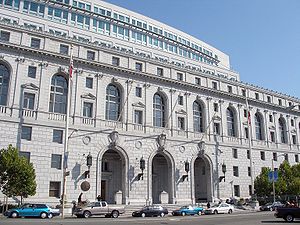Does selling access to court-filed attorney briefs violate copyright law?
By Kristopher A. Nelson
in
July 2009
300 words / 2 min.
Tweet
Share
California courts are turning over attorney work product to for-fee services like LexisNexis and Westlaw, which then resell them (or merely make them available?) to customers. Does this violate copyright law?
Please note that this post is from 2009. Evaluate with care and in light of later events.

- Image via Wikipedia
Legal Research Plus brought this to my attention, originally from the Daily Journal:
. . . Several months ago, . . . Irvine attorney [Ed Connor] learned the California Supreme Court had given his 143-page brief to the legal information service LexisNexis, which was making it available online for a fee. . . .
via LexisNexis and Westlaw violating copyright? « Legal Research Plus.
This idea — that the courts are turning over attorney work product to for-fee services, which then resell them (or merely make them available?) to customers — is an intriguing one. Do briefs filed with the court become public domain? Or do the original author-attorneys retain copyright? Even if the writer (or their employer in some cases, since briefs are likely works-for-hire) retains copyright, does fair use apply to Lexis/Westlaw’s actions? As I said, an interesting idea.
Personally, from a public-policy perspective, I would be inclined to favor allowing LexisNexis, Westlaw, and anyone else to provide access to court-filed attorney briefs. I am bothered a bit about the resale factor — but only because there does not seem to be a free (as in without cost) option for accessing the briefs. I do not believe the public benefits from applying a copyright approach that denies access to the briefs. We are all better off if we can read them.
But like other situations in which I advocate “open access,” there should be more public access than simply LexisNexis and Westlaw’s extremely expensive service.
I’ll be interested to see if this issue goes anywhere in California, or if it just disappears.
Related articles by Zemanta
- Are Westlaw and LexisNexis simply selling “free” information? (inpropriapersona.com)
- 10 Alternative Legal Research Sites (inpropriapersona.com)
